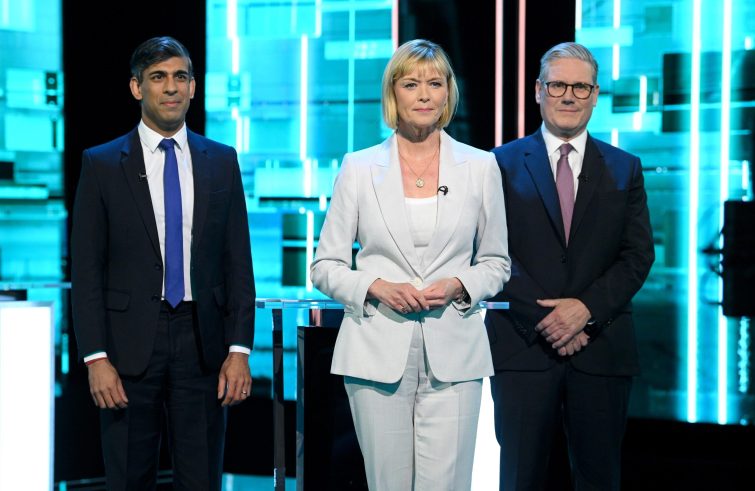
The British political landscape is likely to be revolutionised on 4 July, when some 48.7 million British citizens over the age of 18 from 53 Commonwealth countries, including Irish citizens living in the UK, will cast their votes between 8am and 10pm local time. Keir Starmer’s Labour Party has been ahead in the polls for weeks and is on course to win up to 425 of the 650 seats that make up the House of Commons.
Unprecedented Tory crisis. The Conservative Party, the country’s oldest and most successful, is set to lose up to 257 MPs, down to 108 seats, according to one of the latest projections by polling firm Yougov – an unprecedented collapse in its 150-year history, described by leading commentators as “a catastrophe”, “a crisis from which there may be no way out.”
The right-wing, anti-immigration party ‘Reform’ of Nigel Farage, the former MEP who campaigned most vigorously for the Brexit referendum, is expected to make gains alongside the Liberal Democrats and the Greens,
This populist politician has dealt another blow to the Conservatives’ decline. The Scottish National Party is also struggling in the wake of scandals involving its once popular former leader Nicola Sturgeon. Labour is set to win a large proportion of the 28 seats the Scottish Nationalists are expected to lose, according to the polls. For the first time in the history of the UK, which uses a first-past-the-post voting system in which voters cast one vote for a single candidate, and where the Tories and Labour have traditionally alternated in power, the opposition seat could be occupied by the Liberal Democrats.
No more talk of Brexit. Given the resounding victory of former Prime Minister Boris Johnson, whose mantra of “I will deliver Brexit and we will be a great country again” secured him a majority of 80 MPs in Parliament in 2019, the current political situation is hard to believe. That promise won him votes in the heart of Labour power, the so-called ‘Red Wall’, the seats in northern and central England where, for three or four generations, residents have lived mainly on unemployment benefits, and where investment has come only from the EU. Five years on, that promise has been exposed as a lie.
“For the past two years, opinion polls have confirmed that 58 per cent of British citizens want the United Kingdom to rejoin the EU,
John Curtice, a political scientist at the University of Strathclyde in Scotland, told SIR. “Those who voted Leave realised that leaving didn’t solve the migrant problem, which actually worsened, nor did Britain’s economic situation improve. However, unlike in 2019, no political leader is now talking about Brexit for fear of losing the votes of the 42% of citizens who are still anti-EU. Keir Starmer, who feared losing the votes of the centre and promised very little, owes his victory to Boris Johnson and Liz Truss, the predecessors of the current Prime Minister, who destroyed the political credibility of the Tories. The former broke all the anti-covid rules with his Downing Street parties. The latter has wrecked the British economy with a fiscal package that has caused middle-class mortgages to soar by several hundred euros and increased the cost of living, already inflated by the pandemic and the high market prices caused by the war in Ukraine.”
British Catholics’ vote. “The Catholic citizens, loyal to the Roman Catholic Church, descendants of Irish immigrants, a poor community, have traditionally voted Labour. The Catholic vote then shifted to the Liberal Democrat camp and eventually to the Conservatives when Tony Blair declared in 1997 that the Labour Party would no longer support a united Ireland,” says Francis Davies, a political scientist and lecturer at Oxford and Birmingham universities. “Today, on issues such as abortion, assisted suicide and even poverty, the Labour Party positions are very distant from those of the Church. The Bishops of England and Wales have asked the faithful to vote for MPs who are prepared to lift the restriction requiring that substantial subsidies and tax breaks such as Child Tax Credit and Universal Credit should only be given to households with up to two children. But this is a choice that no political party, not even the Labour Party, is prepared to make.”
An important factor. According to Theos, a British religious studies think tank, Catholics vote like the rest of the population and their vote is determined by their social status and geographic location.
In some constituencies with a large majority of Catholic residents, such as Liverpool and some London districts, and where the Tory-Labour gap is very small, the Catholic vote will determine the winning MP in the constituency.
Similarly, in constituencies in the south of the country, such as Winchester, Guildford and Tunbridge Wells, where the Liberal Democrats have a realistic chance of winning, the Catholic vote will be an important factor in the outcome of the election.











